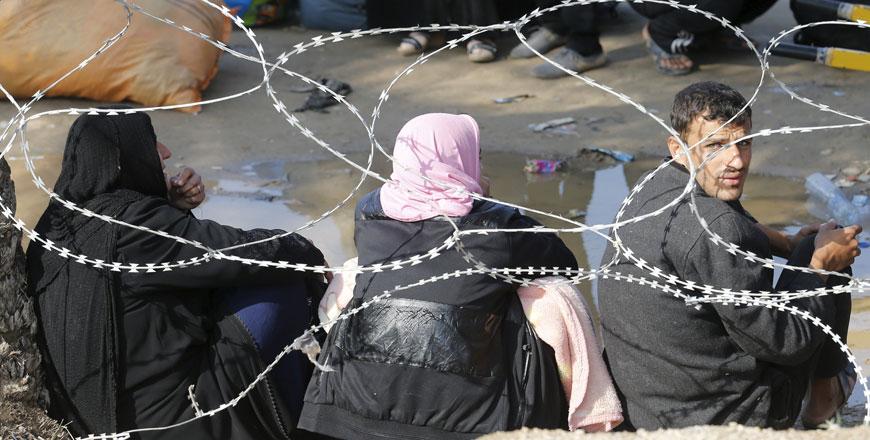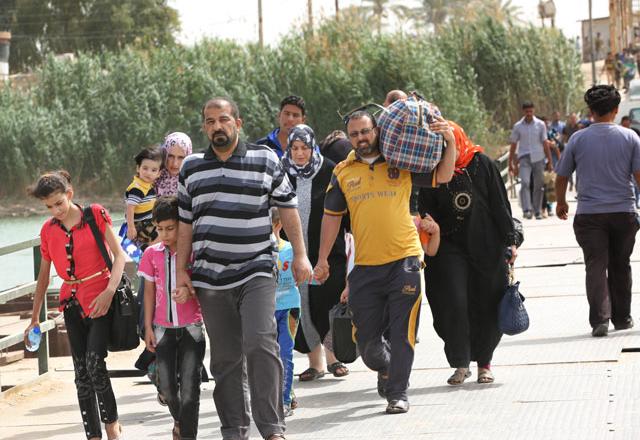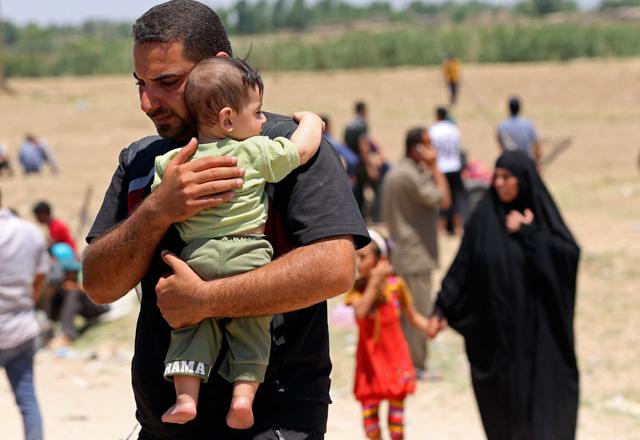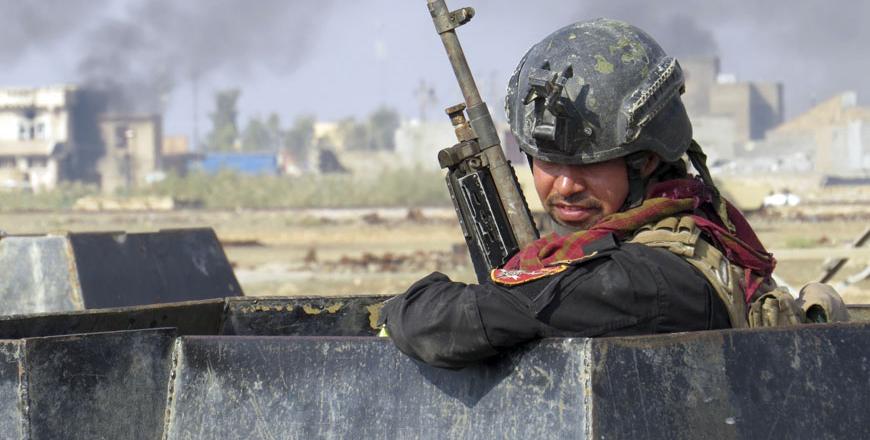You are here
With Ramadi encircled, Iraqi forces brace for urban warfare
By Reuters - Nov 12,2015 - Last updated at Nov 12,2015

Displaced Sunni people fleeing the violence in Anbar arrive at the outskirts of Baghdad on Tuesday (Reuters photo)
BAGHDAD — Iraqi forces appear better positioned than ever to launch an offensive against Daesh militants controlling Ramadi, now that months-long efforts to cut off supply lines to the city are having an effect, but plenty of risks remain.
The fall of Ramadi, the capital of Anbar province, to the group in May was the biggest defeat for Iraq's weak central government in nearly a year, dampening its hopes of routing the Sunni militants from the country's north and west.
Retaking the city of 450,000 would provide a major psychological boost to Iraqi security forces, who have mostly collapsed in the face of advances by the Daesh terror group, which last year seized a third of Iraq, a major OPEC oil producer and US ally.
The ultimate goal for Iraqi forces is to break Daesh’s grip over its main stronghold Mosul, the biggest city in the north. Critical momentum is needed in order to achieve that.
The Ramadi offensive has been impeded by heavy use of improvised explosive devices, inadequate troops and equipment due to government cash shortages, and stringent rules of engagement for US-led air strikes, Iraqi army and federal police officers involved in the battle told Reuters.
Recent gains, however, have raised expectations that the military is set to strike, six months after vowing to quickly seize the city, 60km west of Baghdad.
Iraq's elite US-trained counterterrorism forces have led the campaign to put a cordon around the city. Backed by armoured divisions of the federal police, they cut off the southern and western approaches to prevent reinforcements arriving from cities near the Syrian border.
The forces have taken control of towns, villages and roads in those areas, including Anbar University and sprawling desert areas along the highway to Syria, the officers said.
They also seized eastern outskirts such as Husaiba Al Sharqiya and Matheeq, significantly reducing Daesh's ability to resupply from Fallujah, a nearby city it controls.
Earlier this month, counterterrorism forces seized a large military camp on Ramadi's western outskirts and a handful of districts further north, reaching the western approach to the Palestine Bridge over the Euphrates.
Two army divisions on the opposite side of the river, which runs north to south through Ramadi, are pushing slowly along a northern highway. Last week they reached the Al Jarayshi overpass, less than 2km from the river.
Colonel Steve Warren, the spokesman for the US-led coalition which has been bombing targets in Iraq and Syria for more than a year, said the insurgents were using the Euphrates as "a water-borne highway" to resupply the centre of Ramadi.
Taking the stretch of highway to the bridge would complete the cordon around Ramadi and enable the forces to begin clearing the city one neighbourhood at a time.
‘Every possible problem’
It is not clear how long it will take for the army divisions to make the final push to the Palestine Bridge. They face the same obstacles that have slowed the siege of the city on the other axes and will complicate the street fighting that is to come.
Military officers in Anbar attribute the campaign's pace to explosives planted by militants on an almost industrial scale and to a shortage of troops.
Numbering around 10,000, government forces around Ramadi outnumber Daesh militants there at least ten-to-one, but are of varying quality and readiness.
Stretched along several front lines, Iraq's security forces have been decimated by corruption and two near collapses in the past year in the face of Daesh.
Many of the army's best-equipped troops remain around Baghdad to protect the seat of government.
And despite recent gains, security forces remain cautious, raising questions over the pace of any major operation.
Commanders, wary of incurring casualties to an already depleted force, avoid confrontation with an enemy that regularly tortures and executes captives, army officers said.
"We have to launch an offensive and watch our backs at the same time, which is a heavy burden for our tired soldiers," said a colonel from the 9th division, fighting north of Ramadi.
The offensive has suffered from the absence of the Popular Mobilisation Forces (PMF), paramilitary fighters who played a key role in recent battles that brought the towns of Tikrit and Baiji back under government control.
Washington, wary of the Iranian-backed Shiite militias that dominate the PMF, has sought to keep them from theatres where the international coalition is active.
Repeated leadership changes have hit morale, officers said. Anbar operations command has had three leaders in less than a year, and two senior commanders were also killed in battle.
In addition, poor supply lines mean the frontline troops often lack fuel, ammunition and medical attention.
"Every possible problem an army could have, the Iraqi army has," said Michael Knights, an Iraq expert at the Washington Institute think-tank.
Civilians
Military officers also criticise coalition air strikes for being too concerned with civilian casualties. They said insurgents often fade into the relative safety of residential districts from where they launch mortar attacks.
"It is a nightmare. We suffer high casualties," said one officer close to the Anbar operations commander.
While the US military says its strikes are precise, Anbar residents claim hundreds of civilians have been killed since the campaign began in September 2014. Reuters could not verify those claims.
Knights, who visited coalition headquarters and training bases in and around Iraq last month, said sensitivity to civilian deaths was reducing the air strikes' effectiveness.
While most civilians fled Ramadi months ago, thousands are still thought to live there.
Several residents who spoke to Reuters via the internet reported in recent weeks that the offensive had drawn Daesh militants away from the markets and public squares they once patrolled. Food rations and financial assistance the group provides to civilians have dwindled, they said.
As government forces imposed their cordon, residents in outlying areas have taken refuge in abandoned houses in the city centre.
Others have tried to flee, but with poor communications and limited information about the offensive, many have struggled to find a way out.
Related Articles
Iraq security forces have recaptured areas lost earlier to Daesh terror group in and around the battleground city of Ramadi, security officials said Tuesday.
Iraq's military has dispatched reinforcements to help its battered forces in Ramadi, a city now largely held by the Deash terror group after its militants swept across it the day before, an Iraqi military spokesman said Saturday.
BAGHDAD — Iraqi forces have cut Daesh's last supply line into the western city of Ramadi by seizing a key bridge, Iraqi officials and a mili


















